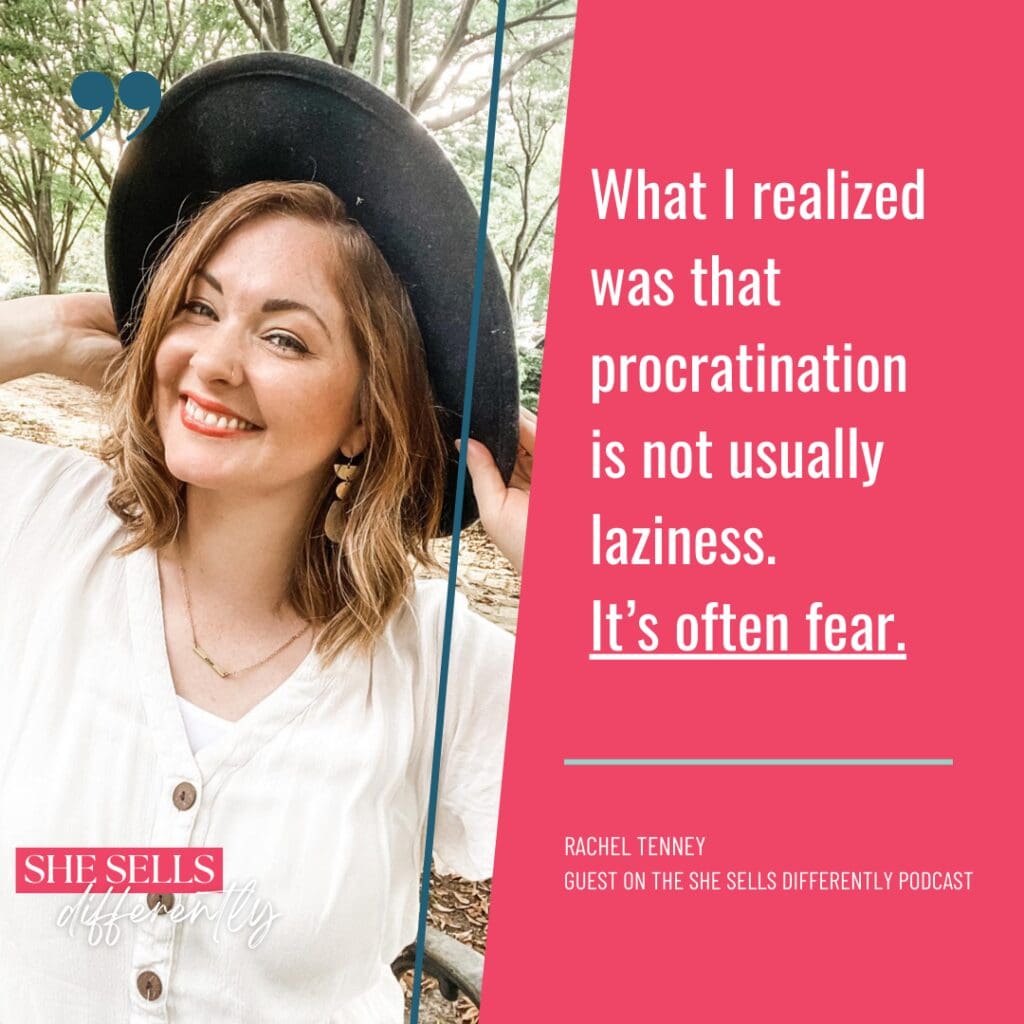Do you have fears and emotional barriers that are holding you back from having a successful business?
Today I am collaborating with my biz bestie, Rachel Tenney, and she is sharing her experience with fear and disappointment from a failed launch and how these challenges shaped her business journey.
Recognizing the emotional barriers that are holding you back
Rachel notes that we don’t often don’t recognize the emotional barriers that get in our way.
As business women, we’re quick to want to look for a practical solution for what’s going on in our business.
So, if something’s not working, if we don’t feel like we’re making the traction that we want to make, we will quickly jump to needing a different strategy or a new plan.
And we’re looking at it only from a practical business standpoint, and we’re not looking at the other piece of the equation, which is us and what we are bringing into our business, including our emotions.
And so oftentimes we aren’t even recognizing that this whole emotional battle is happening inside of ourselves.
And we’re just bypassing that piece and moving on to the practical side.
And a lot of people do talk about mindset, which Rachel notes is a big piece of this. They go hand in hand, but we can quickly jump to mindset as well when we’re thinking about like what’s wrong with our business.
And she says that the underlying piece of it is actually our emotions.
What Rachel learned from her failed launch
Rachel had launched a free thing and did not do a proper launch for it.
And it flopped as you can imagine, but she had really put her heart out there with this free thing.
Rachel really thought it was going to serve people and was really excited about it.
And then it just did not take off the way she wanted it to.
She had written in her journal and marked launch day and put this little rocket by it. And it was going to be great!
And she really prayed to the Lord about it. And she asked him to please bless this because she really needed a win. And then it wasn’t.
And she felt so betrayed by the Lord in that, because she had really put her heart out there and really became vulnerable.
And she knew that she shouldn’t be angry at God for that. He always does what is good for us.
So, there was a part of her that wasn’t allowing herself to grieve that and lament that and be real with the Lord and tell him that she was disappointed.

Being an emotional stuffer as an emotional barrier
Every time she would flip through that journal to write a new entry; she would see that little rocket. And it felt like a dagger went in her heart.
Like, oh, that doesn’t feel good. But she was an emotional stuffer.
There are two different types of people when it comes to emotions, the people who are all in their emotions all the time and the people who are like, my emotions don’t matter. I’m going to just stuff that aside and get stuff done.
And so, she just kept stuffing that like, okay, that doesn’t matter. Keep moving on, put a positive spin on it, keep it moving.
And a year later, she’s flipping through her journal and constantly seeing that little rocket.
And she felt that dagger in her heart. And thought, maybe she needs to deal with this. It’s been a year and she’s still not like past this.
She then spent 24 hours processing what happened with the launch and was able to move past that grief of a failed launch.
Rachel’s 7-step Process to overcoming emotional barriers
Assess
First observe – what is going on in me? What feelings am I feeling?
And part of this is even recognizing the bodily sensations that we have with somatic.
Are my shoulders really tight?
Do I have a knot in my stomach?
Do I have a restricted feeling in my throat?
Where are you feeling your emotions?
And sometimes for emotional stuffers like Rachel, we recognize it first in our body before we recognize, oh yeah, I do feel anxious.
So, assess, and then once you know what it is that you’re dealing with.
Lament
After you assess then you want to lament.
Lament is such a foreign concept to us as Americans, because it’s not part of our culture.
A lot of other cultures like Jewish culture, have built in systems for grieving as a community or for grieving in general.
As Christians, sometimes we can feel like, if I believe that God is in control of everything and he does everything for my good, then why should I grieve if something happens, I should just trust God in that.
But we call that spiritual bypassing because you don’t have to shortcut the process.
Behold
The third step is behold, which is to behold who God is and how that changes your situation.
When you recognize that the Lord is in control and the Lord is good, both of those things together, then you sat in this grief, but you don’t have to stay there and you can move forward in hope.
And so, it could get easy to stay stuck in grief and despair if you don’t move forward in, but what is true about my circumstances?
And anybody can take a look at that and say, well, what is true though about my circumstances?
What is something that I can grab onto that’s bigger than me and bigger than just my perspective on things?
Reframe
Step four is to reframe.
So, this includes pulling in what we just thought about in the last step of beholding.
How does what’s true about God reframe how I’m understanding what happened to me?
Rachel likes to call this our inner story.
We all have an inner story that we’re telling ourselves about what happened if you’re grieving a loss.
And so, if you’re grieving a disappointment or grieving something, and it’s easy for that story to not be exactly accurate.
So, that happens to us all the time in business though, and we don’t even recognize that we’re making up stories.
You post something on Instagram and it gets crickets and you make up a story.
But the question with this reframing is, is that story actually accurate?
Is that the real story that’s happening?
Is that true to reality or is that what I’m telling myself?
And oftentimes we are way harder on ourselves than we should be.
And the truth is actually much kinder to us in recognizing like, like I saw, I saw somebody, a friend of mine yesterday on Instagram did a great live. And this person is like very put together, like everything, but they had like two likes on their post. And I just felt bad for them because I thought, I hope they don’t create a story in their mind of, like, people don’t like me because I think they’re amazing.
Challenge
The next step is challenge, which is a difficult one, but it’s also so hopeful.
After you’ve done all this work and you’ve sat in your grief and you’ve reframed things and looked at the story you’re telling yourself and all this stuff, then you get to say, now it’s time to move forward and you’re still going to be scared.
Like the old saying of bravery is not the absence of fear. It’s moving forward in the fear.
And that’s what you have to do in this step is to say, okay, I’ve allowed myself to feel all these things. And now I’m going to take the next step to challenge myself to do the next thing.
And it could be a small thing.
It could be something really simple.
For Rachel, it was launching a whole course.
And that was really scary, but she had the ability to do that after going through these steps.
And she did not have the ability to do that before going through these steps.
You have to do the hard work to get to the place where you can stand on something and be like, I’m going to be brave, even though this is hard.
Encouragement and community
The last step and really that one goes all through the other steps. It’s interwoven in all of those things because we need other people to help us reframe those narratives and reframe those stories because we just have our own perspective and it’s so hard to see something else other than the way that we’ve seen it.
And so, to have other people speak into our lives, and be able to say, this is true about what you went through, or encourage me, then it helped me to bolster myself in the truth instead of continue telling myself the same story over and over.
The journey of entrepreneurship is as much about mastering emotions as it is about business skills.
Rachel shares a good reminds that acknowledging, processing, and harnessing our emotional barriers can lead to profound personal and professional growth.
By embracing these emotional barriers, entrepreneurs can transform fears into frontiers of strength, navigating their ventures with renewed clarity, grace, and confidence.
Resources
Own your own emotions course and use code SHESELLS for $50 off the course https://thevocasociety.mvsite.app/af/link/231513630/1 use code SHESELLS for $50 off the course

